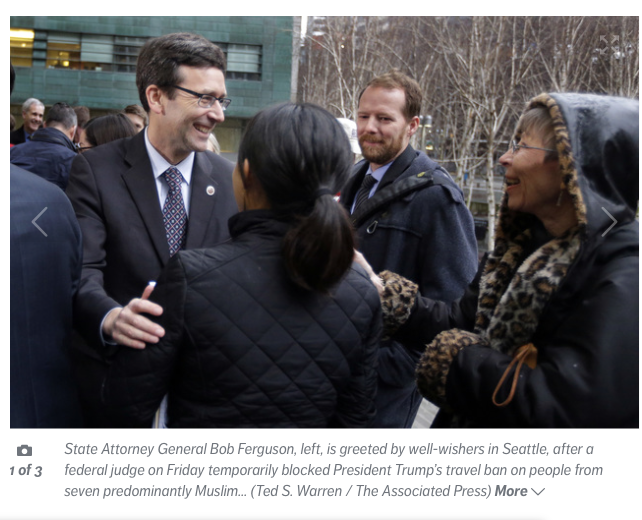In a stunning rebuke, a federal judge in Seattle has ordered a national halt to enforcement of President Trump’s controversial travel ban on citizens from seven predominantly Muslim nations.
U.S. District Judge James Robart ruled Friday afternoon in favor of Washington Attorney General Bob Ferguson, who sued this week to invalidate key provisions of Trump’s executive order.
In an oral ruling, Robart granted Ferguson’s request for temporary restraining order “on a nationwide basis,” prohibiting federal employees from enforcing Trump’s order.
The order indefinitely blocks entry to the United States for Syrian refugees and temporarily suspends entry to citizens of seven majority-Muslim countries.
“The Constitution prevailed today,” Ferguson said in a rainy news conference on the federal courthouse steps following the ruling. “No one is above the law — not even the president.”
Gov. Jay Inslee, writing on Twitter, called the ruling “a tremendous victory” for the state of Washington.
“We should feel heartened by today’s victory and more resolute than ever that we are fighting on the right side of history,” Inslee said.
In his ruling, Robart said Washington had met the high burden to justify a restraining order by showing Trump’s order was causing “immediate and irreparable injury,” and that the state had a substantial likelihood of winning its underlying lawsuit challenging the constitutionality of the travel ban.
A spokesperson for the U.S. Justice Department in Washington, D.C. did not immediately return phone calls seeking comment.
At almost the same time of Robart’s ruling Friday, the Trump campaign sent an email to supporters, saying: “This travel ban is not about religion, this is about keeping our country safe. ”
“It’s a relief,” said Mark Okazaki, executive director of Neighborhood House, a longtime social-service provider for immigrants and refugees. He thanked Ferguson for bringing the lawsuit forward, saying it will ease some stress and anxiety.
The ruling in Washington comes amid other legal battles over Trump’s travel ban in states across the country. On Friday, a judge allowed Virginia to join a lawsuit challenging the order, and a federal judge in Boston declined to extend a temporary injunction against it, for instance. Opponents are suing in at least four other states.
Ferguson, a Democrat, filed the lawsuit Jan. 30, three days after Trump signed the executive order, making Washington the first state to challenge the ban.
At a press conference on Monday, Susan Hutchison, chairman of the Washington State Republican Party, accused Ferguson of filing the lawsuit solely as a political ploy, to further a possible future run for governor.
“I think he knows that he’s got very thin ice he’s standing on legally,” she said. “I’m not a lawyer, but I have talked to lawyers today, and they have all said this is a very thin argument legally.”
Robart, who was nominated for the federal bench by Republican President George W. Bush in 2003, disagreed. He ruled that despite respect for the limits of judicial power, “we must intervene” to fulfill the judiciary’s duty to uphold the constitution.
In a legal filing asking for the restraining order, Ferguson had argued Trump’s travel ban targets Muslims, violating the constitutional rights of immigrants and their families.
“Federal courts have no more sacred role than protecting marginalized groups against irrational, discriminatory conduct,” said the filing by Ferguson, state Solicitor General Noah Purcell and Colleen Melody, head of the attorney general’s civil-rights unit.
In a response brief filed late Thursday, attorneys for the Trump administration said Washington state lacked standing to bring the challenge, and that the president has properly exercised his broad, border-security powers to protect Americans.
“Every President over the last thirty years has invoked this authority to suspend or impose restrictions on the entry of certain aliens or classes of aliens, in some instances including classifications based on nationality,” reads the administration brief, submitted by Chad Readler, acting assistant U.S. attorney general, and other Justice Department lawyers.
The administration brief also cited previous court rulings that say there is no constitutional right of entry to the U.S. for foreign nationals.
In a 19-page complaint, Ferguson alleged Trump’s executive order violates constitutional guarantees of religious freedom and equal protection. The state of Minnesota has joined as a plaintiff, while attorneys general in several other states have also taken legal action against the controversial ban.
Ferguson’s lawsuit includes quotes by Trump during his presidential campaign, including his original pledge for “a total and complete shutdown of Muslims entering the United States.” The lawsuit alleges are evidence that the order was “motivated by animus and a desire to harm a particular group.”
Trump and his allies have hit back against claims of anti-Muslim bias, arguing the nations subject to the ban were previously identified by the Obama administration as potential security threats.
Washington’s lawsuit has been backed by major corporations, including Seattle-based Amazon.com and Bellevue-based Expedia, which have criticized the immigration order’s impact on the state’s economy, businesses and higher-education institutions, as well as on families and residents.
At the hearing Friday, Purcell said the harm to University of Washington’s students and faculty who are stranded out of the country due to the order is “direct and immediate.”
The president’s order sparked legal chaos and a wave of protests nationwideover the weekend, with a huge crowd pouring into Seattle-Tacoma International Airport amid reports that refugees and immigrants from countries targeted by the travel ban were being detained there.
Some immigrant air travelers were flown back to their countries of origin, while others were allowed to enter the country with the help of immigration attorneys.
More than 21,000 Washington residents were born in one of the seven majority-Muslim countries: Somalia, Iran, Iraq, Sudan, Syria, Libya and Yemen, U.S. Census data show.
The state’s lawsuit said 7,279 noncitizen immigrants in the state are from those seven countries.



You must be logged in to post a comment Login